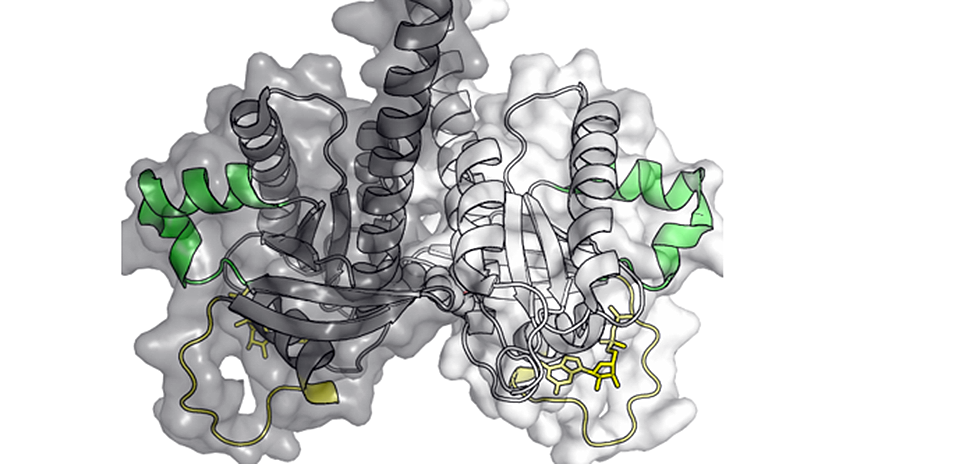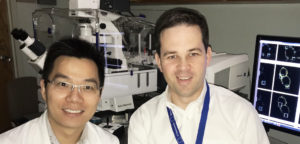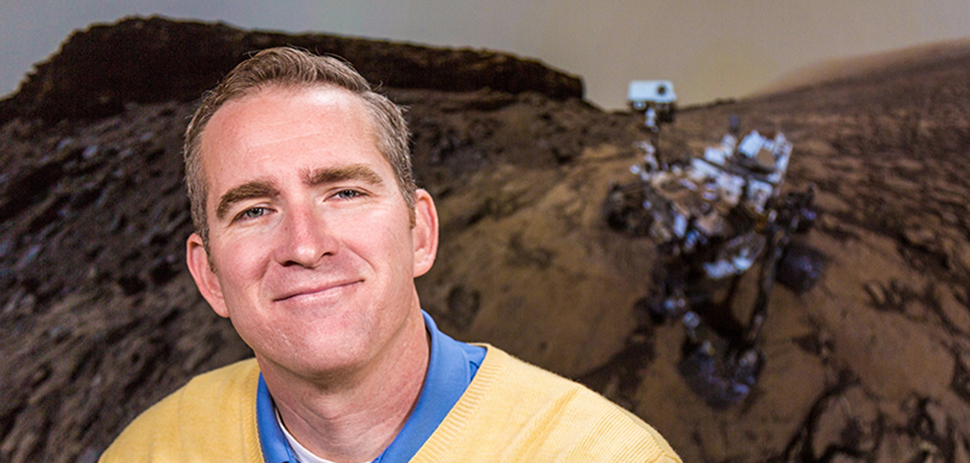ANSWER TO A MARTIAN MYSTERY IS BLOWIN’ IN THE WIND
![]() We’ll need to travel to Mars for our first item — not literally, but through the research being done by a fluid dynamics expert from the University of Texas at Dallas and a colleague.
We’ll need to travel to Mars for our first item — not literally, but through the research being done by a fluid dynamics expert from the University of Texas at Dallas and a colleague.
William Anderson and his colleague, University of Washington researcher Mackenzie Day, have used their expertise to propose a solution to a longtime Martian mystery: What causes the phenomenon of the stratified Mount Sharp located downwind from the center of an ancient meteorite impact area, Mars Gale Crater?
“On Mars, wind has been the only driver of landscape change for over 3 billion years.”
William Anderson
Mars is an arid, dusty planet, but more than 3.5 billion years ago the crater would have been filled with sediments transported by flowing water. Now, there’s just a lot of wind on the Red Planet.
It’s those winds — or the vortices they contain — that would have contributed to the sculpting of a 3-mile-high mountain peak that’s at a similar height to rim of the crater, the researchers proposed.
“On Mars, wind has been the only driver of landscape change for over 3 billion years,” Anderson said in a release from the university. “This makes Mars an ideal planetary laboratory for aeolian morphodynamics — wind-driven movement of sediment and dust. We’re studying how Mars’ swirling atmosphere sculpted its surface.”
Anderson is an assistant professor of mechanical engineering in the Erik Jonsson School of Engineering and Computer Science. The co-authored paper was published in the journal, Physical Review E.
Read more here at sci-news.com about the research.

RAS mutations are a leading cause of cancers. [Illustration courtesy of UT Southwestern Medical Center]
RESEARCH: ‘DIMERS’ ACT IN PAIRS TO CAUSE CANCER
Research conducted by a team at UT Southwestern’s Simmons Cancer Center could lead to new treatments for cancers driven by mutated RAS genes, among the most common causes for pancreatic and lung cancer.

UT Southwestern researchers Zhiwei Zhou (left) and Dr. Kenneth Westover
[Photo courtesy of UT Southwestern]
Research at the center shows that RAS molecules act in pairs that are known as dimers in causing cancer.
“RAS mutations are one of the most common causes of cancer and there are no options for attacking them. The dimerization activity of RAS gives us a solid lead in moving forward,” Dr. Kenneth Westover, assistant professor of radiation oncology and biochemist at Simmons, said in a release.
Westover is leading the team investigating the RAS dimers. The team’s work was supported by the U.S. Department of Defense, V Foundation for Cancer Research, and the Cancer Prevention and Research Institute of Texas.
Find out more about the research here.
PUT DOWN THAT PHONE! HOW MOBILE DEVICES AFFECT WORK, HOME LIFE
Interacting with work via mobile device while at home in off hours. Many of us do it. Just admit it.

Wayne Crawford
[Photo: Sharon Ellman]
Research done by a team that includes the University of Texas at Arlington, Baylor University, Texas A&M University, and Utah State University shows that the practice could have a negative implications both at work and with a spouse.
The team surveyed 344 married couples. All the participants work full time and use mobile devices or tablets for work reasons at home.
“There is plenty of research on technology and how it affects employees,” said Wayne Crawford, assistant professor of management at UTA’s College of Business. “We wanted to see if this technology use carried over to affect the spouse negatively at work.”
Crawford was one of the co-authors of Your Job is Messing With Mine! The Impact of Mobile Device Use for Work During Family Time on the Spouse’s Work Life. It was published recently in the Journal of Occupational Health Psychology.
The research concluded mobile device use does have an impact. Find out more here.
![]()
Get on the list.
Sign up to keep your eye on what’s new and next in Dallas-Fort Worth, every day.
































































